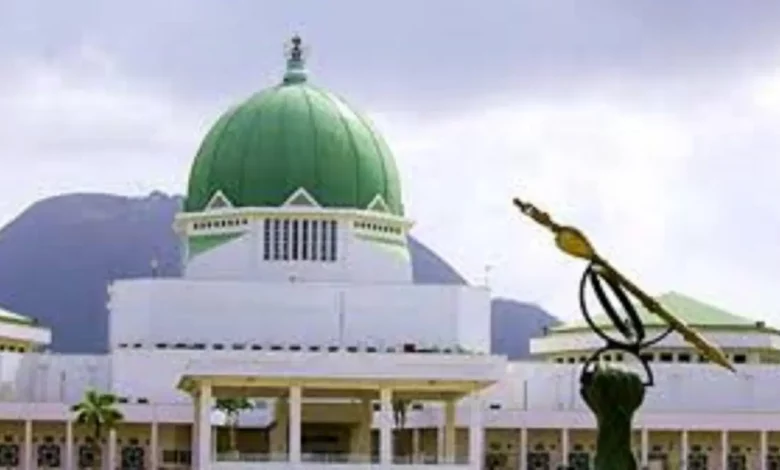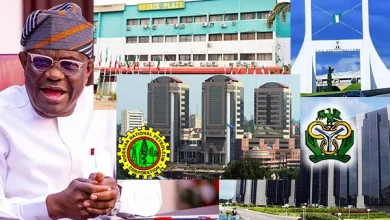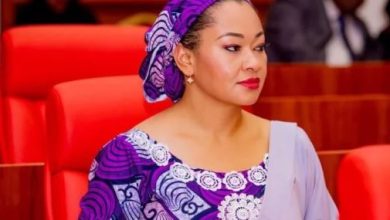
•NASS passes 816 bills in 25 years, to spend N514bn in 2024
•Why we increased, passed budget — Akpabio, Abbas
The National Assembly is literally in the eye of the storm over its handling of the 2024 budget, in which collectively, the federal legislature will spend a princely N514 billion this year.
In line with the Federal Government’s plan to begin the fiscal year on January 1, the National Assembly on December 30, 2023 passed the budget presented by President Bola Tinubu, on November 29, 2023.
In passing the budget, the lawmakers raised the budget from N27.5 trillion to N28.78 trillion. They also jerked up the N197.93bn originally proposed by the Executive for the National Assembly N344.85 billion.

However, if other planned expenditures tied to the National Assembly, such as N100bn for zonal intervention projects and votes for the completion of ongoing projects were added, the legislature would be spending at least N514bn from the N28.78 trillion budget this year, according to Statisense.
With this, it means that by the end of 2024, Nigeria would have spent the sum of N3.132 trillion on the National Assembly, which has 109 senators and 360 House of Representatives members, going by budgetary allocations since 1999.
Read Also: National Assembly Accelerates Process for Timely 2024 Appropriation Bill
The N3.132 trillion trillion is 5.52 per cent of the N176.470 trillion appropriated by the Federal Government since Nigeria returned to civil rule in 1999, Vanguard’s check indicates.
Within the period, the National Assembly passed 816 bills that were signed into law by various presidents. Although the legislature, which is the symbol of democracy, performs other functions including oversight on the other arms of government, especially the executive arm, and passes motions and resolutions, lawmaking or passage of bills is, arguably, the primary duty of the lawmakers.
Thus, if the N3.132 trillion allocated to the National Assembly since 1999 is accounted for by the number of bills that became laws, it means a bill costs N3.838 billion.
In the 4th National Assembly, 1999 -2003, the Senate passed 65 bills while the House of Representatives passed 112 bills but the lawmakers in both chambers had concurrence on 65.
Then, there was much leadership instability in the National Assembly on account of frosty relations with the executive arm among other issues.
There was a marked improvement in the 5th Assembly when 129 bills were passed (see table). The figure plummeted to 72 bills in the 6th Assembly, rose to 128 in the 7th and all-time high of 282 bills in the 8th Assembly, and 134 bills in the 9th Assembly that expired at the weekend.
The 9th Assembly would have had more bills to its credit but for the refusal of President Buhari to assent and the inability of the legislators to override him.
Also, the 9th Senate, as of June 10, 2023, according to the immediate past Senate President, Ahmad Lawan, considered 1,129 bills and passed over 500. President Buhari assented to 131 bills.
“In the last few days, President Bola Tinubu has assented to two bills passed by the 9th National Assembly, namely the “Constitution of the Federal Republic of Nigeria, 1999 (Fifth Alteration) (No.37) Bill, 2023”, which extends the retirement age of high court judges, and others, from 65 to 70 years. This was the first Bill to be signed by the President since taking the oath of office. Only yesterday, 9th June, 2023, he also assented to the Electricity Act 2023, which we had passed in July 2022. The new law replaces the Electricity and Power Sector Reform Act of 2005,” he said in his valedictory speech.
On June 12, President Tinubu signed the Student’s Loan (Access to Higher Education) Bill, 2019, into law. The bill was sponsored by Rep Femi Gbajabiamila.
So, altogether, the 9th National Assembly had 134 bills signed into law.
10th NASS
So far, the Senate President Godswill Akpabio-led 10th National Assembly is said to have passed 6 bills including the 2023 Supplementary Budget Bill and the 2024 Budget.
However, the legislators’ handling of the 2024 budget elicited criticisms in the polity.
Budget has unbelievable allocations – LP
Describing some of the allegations as unbelievable, the Labour Party urged the President Tnubu-led All Progressives Congress APC administration to pay greater attention to the security and welfare of Nigerians in the New Year as opposed to its current fixation on the comfort of government officials.
In a statement by its National Publicity Secretary, Obiora Ifoh, the LP said: “As we bid the year 2023 farewell and usher in 2024, we in the Labour Party, pray that God intervenes and brings succor to us all as Nigerians have been exposed to uphold hardships because of maladministration and insensitive government in place.
“While we pray, we also enjoin Nigerians to take a closer look at budgetary provisions and sectoral allocations in the 2024 budget.
“Without a doubt, the President Bola Tinubu-led All Progressives Congress administration has displayed a disdain for the security and welfare of Nigerians.
“Looking at the 2024 budget, we cannot fail to notice the undue attention given to the comfort of those in power to the detriment of the majority of Nigerians.
“Critical sectors of the economy such as Education and Health were allocated N1.27tr and N1.33tr representing 7.9 and 4.8 per cent of the entire budget respectively.
“This is in a budget which has items like N3bn for Senate Car Park, N1bn for Constitution Review, N78.62bn for the House of Representatives and N36.727bn for the National Assembly Office, N4bn for National Assembly Recreation Centre among other unbelievable allocations.
“Our Presidential candidate in the 2023 elections, Mr Peter Obi, had earlier drawn attention to the misplaced priorities and insensitivity of the President and his party in the allocation of staggering sums for the renovation of the President and Vice President’s Offices and trips for them and their hangers-on for which a humongous amount of N35.961bn was set aside.
“Nigerians have continued to suffer in the hands of bandits, terrorists, kidnappers and criminals of all sorts but all the administration is concerned about is the comfort of those elected to serve and make life better and more meaningful for ordinary Nigerians.
“It is our hope that those concerned will have a rethink and put the welfare and security of ordinary Nigerians first in the coming year, it is not too late to revisit the 2024 budget.”
CUPP kicks
The Coalition of United Political Parties, CUPP, said it was “”appalled by the figures making the rounds on the amount inserted and appropriated by the National Assembly for itself in the 2024 Appropriation Bill.”
In a statement by its National Secretary, Chief Peter Ameh, the CUPP urged President Tinubu to withhold his assent until those sums and others inserted into it are expunged, saying, it “knows that when Nigerians elected the Members of the National Assembly, they were not elected to go and start feeding fat on our collective patrimony but to make laws that would enhance and improve the lives of long-suffering Nigerians who have been asphyxiated by the onerous policies of the immediate past administration of President Buhari, but we now know that we were flogged with horse whips, but we are now being punished with scorpions and snakes.
“For NASS to bold-facedly jerk up and insert all those multi-billion naira projects which were never a part of their brief, and the appropriation bill originally forwarded by President Tinubu, CUPP views this as insensitivity on the part of National Assembly and rubbing of salt and iodine to an already gangrenous wounds of Nigerians who are gasping for survival.
Let us imagine what the one hundred billion naira inserted by the National Assembly can do for Nigerians in the areas of health, food production, education, and others.
Cottage hospitals will be built in at least every senatorial district, or farm settlements established in each senatorial district, or etc, in at least every senatorial district, which also generates and employs labour
“This unwholesome behaviour of the National Assembly and its leadership has brought to the fore the need to convene a constitutional conference to give Nigerians a constitution that will work for everyone.
“They are more engrossed in selfish law-making than public interest law-making. Unfortunately, the appropriated item-by-item contract figures obviously seem to be over bloated judging from the project cost each.”
Why we increased, and passed 2024 budget- Akpabio, Abbas
Amid the criticisms, Senate President Godswill Akpabio said they passed the budget to address the sufferings of Nigerians, adding that the citizens would in a short while start reaping the benefits of the budget.
Also, Speaker of the House of Representatives, Tajudeen Abbas, said the National Assembly raised the 2024 budget from N27.50 trillion to N28.78 trillion to ensure balance after diligently scrutinising the proposal forwarded to it by President Tinubu
Noting that the N28.78 trillion harmonised budget passed by the National Assembly would define Tinubu’s administration as people-centric
Speaking on the adjustments made in the budget from N27.50 trillion presented by the president to N28.78 trillion passed by the House and the Senate, the speaker said the lawmakers scrutinised every aspect of the budget
Tajudeen also urged Nigerians to expect a notable difference in the implementation of the budget when signed by President Bola Tinubu.
As expected, the president has signed the budget into law.
It is to be seen if the budget would address the myriad of socio-economic challenges facing Nigerians
Major bills signed into law by Tinubu
Apart from Appropriation Bills, some of the bills signed into law President Tinubu since he assumed office include:
Electricity Act 2023
President Bola Ahmed Tinubu gave his assent to the Electricity Act 2023, a legislative piece approved by the National Assembly (NASS) in July 2023. This Act is set to supplant the Electricity and Power Sector Reform Act of 2005, presenting a comprehensive framework to navigate the post-privatization phase of the Nigerian Electricity Supply Industry (NESI) while fostering increased private sector investments in the sector.
The Electricity Act aims to break the monopoly in Nigeria’s electricity generation, transmission, and distribution at the national level, thereby granting states, companies, and individuals the authority to independently generate, transmit, and distribute electricity.
Within the provisions of this Act, state governments have the prerogative to issue licenses to private investors, enabling them to operate mini-grids and power plants exclusively within the state boundaries. It’s important to note that the Act explicitly excludes interstate and transnational electricity distribution.
Access to Higher Education Act (Student Loan)
In June, President Tinubu signed into law the Access to Higher Education Act, a legislative measure designed to improve accessibility to higher education for Nigerian students. This legislation introduces interest-free loans aimed at alleviating financial barriers that impede educational pursuits.
Furthermore, the Act ensures that all students pursuing higher education in public institutions have an equal entitlement to access these loans, with no discrimination based on gender, religion, tribe, position, or disability.
Data Protection Act
The Data Protection Act became the third legislation signed into law by President Tinubu following his inauguration.
At its core, the Bill is centred around safeguarding individuals’ data. It imposes legal obligations on organizations and individuals to uphold and protect individuals’ privacy by securing their data.
The law replaces the Nigeria Data Protection Bureau (NDPB) established by President Buhari in February 2022 and establishes the Nigeria Data Protection Commission.
Judicial Officers Law
The legislation, officially named ‘Constitution of the Federal Republic of Nigeria, 1999 (fifth alteration) (No.37), 2023,’ received presidential approval on June 8, marking President Tinubu’s inaugural signing of legislation.
This law establishes a standardized retirement age for judges at 70 years and ensures consistent pension rights for judicial officers across various superior courts.
Source: vanguardng





